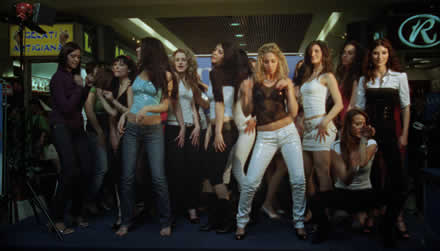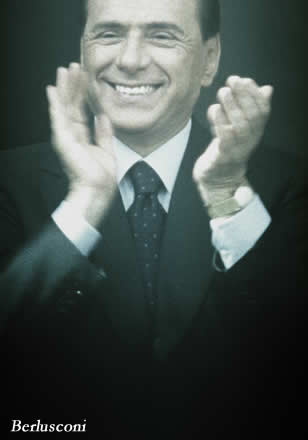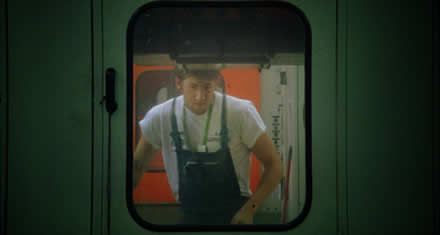 Prime Minister Berlusconi’s control of Italian media and politics has been the subject of many films. Television satirists who dared to take him on were driven from the airwaves. Marginalized by Berlusconi, Daniele Luttazzi, responded by a stage show “Bin Laden can be on TV, but I can’t.” In 2003, well-connected Sabina Guzzanti (her father, Paolo Guzzanti, is a center-Right MP) filmed a six part series for the state-owned RAI TV. Playing Berlusconi, comedienne Guzzanti quipped “Italy ranks 53rd in a worldwide index of media freedom, after Benin, Ghana and Bolivia.” Her closing remarks “See you next Sunday. Perhaps.” were her last remarks on the air. RAI pulled the series. The official line was satire should be used to make a politician likeable not “as a political weapon.” When Berlusconi’s Mediaset, which runs Italy’s three largest private TV stations) sued RAI for damages, Guzzanti toured the country with her sold-out one-woman stage show, then filmed the hard hitting documentary “Viva Zapatero.”
Prime Minister Berlusconi’s control of Italian media and politics has been the subject of many films. Television satirists who dared to take him on were driven from the airwaves. Marginalized by Berlusconi, Daniele Luttazzi, responded by a stage show “Bin Laden can be on TV, but I can’t.” In 2003, well-connected Sabina Guzzanti (her father, Paolo Guzzanti, is a center-Right MP) filmed a six part series for the state-owned RAI TV. Playing Berlusconi, comedienne Guzzanti quipped “Italy ranks 53rd in a worldwide index of media freedom, after Benin, Ghana and Bolivia.” Her closing remarks “See you next Sunday. Perhaps.” were her last remarks on the air. RAI pulled the series. The official line was satire should be used to make a politician likeable not “as a political weapon.” When Berlusconi’s Mediaset, which runs Italy’s three largest private TV stations) sued RAI for damages, Guzzanti toured the country with her sold-out one-woman stage show, then filmed the hard hitting documentary “Viva Zapatero.”
Nanni Moretti’s 2006 “Il Caimano” (The Alligator) skewered the right-wing politico media mogul. In 2009, 78 year-old master director Ettore Scola announced that he would not make films as long as Berlusconi was in power. “Cinema is also an industrial endeavor. Among other things, Berlusconi controls the press and TV, even cinema, to a large extent, depends on him. “
When Erik Gandini’s “Videocracy” opened in Italy, RAI and Berlusconi’s media empire banned trailers for the satirical film, which RAI characterized as “offensive to the honor and personal  reputation of the prime minister.” The ban fueled an uproar that filled movie theatres around the country.
reputation of the prime minister.” The ban fueled an uproar that filled movie theatres around the country.
Gandini’s stylized inquiry posits that Berlusconi controls a Media-neo-fascist state, masking his political motives under an ideology of Reality TV instant fame. Gandini’s Situationist inflected piece serves as a fun-house mirror look at our own dumb-downed Celebutant culture.
Though the film doesn’t discuss it, Berlusconi’s lock on TV, where supposedly 80% of Italians get their information, enabled him to shut out the center-left Democratic Party’s opposition by a mere 46.5 percent of the vote, in his 2008 re-election. As in the US and the rest of Europe, election results are very close as electorates, evenly divided and disabled in rabid Culture Wars, scrimmage for relatively small electoral advantage.
The once respected RAI suspended talk shows prior to this year’s mid-term elections. (Berlusconi is under investigation for pressuring Italy’s media watchdog to block transmission of Michele Santoro’s left-leaning ‘hostile’ TV program, “Annozero“.)
One -time cruise ship crooner Berlusconi began his media empire filming a sleazy quiz show in a bar, where, when call-ins answered quiz questions correctly, housewives stripped on camera. When he bought up 90% of Italy’s television programming his crass programming didn’t change much, except for the budget. His 30-year Mediaset mixture of soaps, football, luxury and sex has entirely transformed the Italian culture, formerly a traditional culture dominated by Catholic and Communist ideals. Helping to shape the electorate through TV, Prime Minister Berlusconi has already served longer in the office than anyone since 1946, and created a “cultural” legacy that may never be transcended.
‘Velinas’, or showgirls, are the mainstay of all Mediaset programming- mute voluptuous beauties who lap-dance guests, strip on air, or serve as the butt of sexist on-air pranks. One of Berlusconi’s former topless showgirls Mara Carfagna (think Vanna White in scanty apparel) is now the Minister of Gender Equality. (His “People of Freedom ” party recently nominated four starlets as candidates for the European parliamentary elections.)
A poll among young girls in Milan showed their top choice of profession was to be a Velina, each hoping to marry a football player or become a minister. (Plastic surgery rates have soared in Italy, explains Gandini.) Cocksman Berlusconi brags about his own in public.
Berlusconi has positioned himself as a media Zeus, able to confer instant celebrity to a generation of working class, fame seeking young women. (In campaign ads a choir of women thank “God for Berlusconi.”) A slo-mo  sequence shows fame-seeking girls gyrating for a crowd of mall onlookers, each hoping to be selected as a Velina. It’s “Girls Gone Wild” on steroids.
sequence shows fame-seeking girls gyrating for a crowd of mall onlookers, each hoping to be selected as a Velina. It’s “Girls Gone Wild” on steroids.
In a scene at Berlusconi’s star-studded private island “Billionaire Club”, the haunt of Paris Hilton and Tony Blair, Berlusconi looks over girls to choose his new TV weather Girl. Berlusconi’s friend and neighbor sells off pictures from his power parties. Surrounded by “beefcake” models, his pal, powerful TV agent, Lele Mora, plays Mussolini’s fascist hymns as background music in his Sardinian Villa.
One-time Berlusconi assistant and cagy paparazzi Fabrizio Corona sells back compromising pictures directly to the stars or socialites, cutting the media out. When Carona’s jailed for slander, his book “La mia Prigione” (My Prison), written under house arrest, makes him a bone fide media star. Corona parlayed shameless behavior on Reality TV into a dramatic acting career. During his divorce from super-model Nina Moric (he’s since married Argentine show girl Belén Rodriguez) he wore a wire and taped the whole trial.
The fascinating, slightly prurient film has a weak closing act, which led me to wonder if someone powerful got to Gandini mid-stream. Even so, you’ll be dumbstruck by this scary look at the media transformation of our culture.

